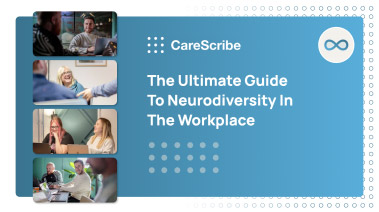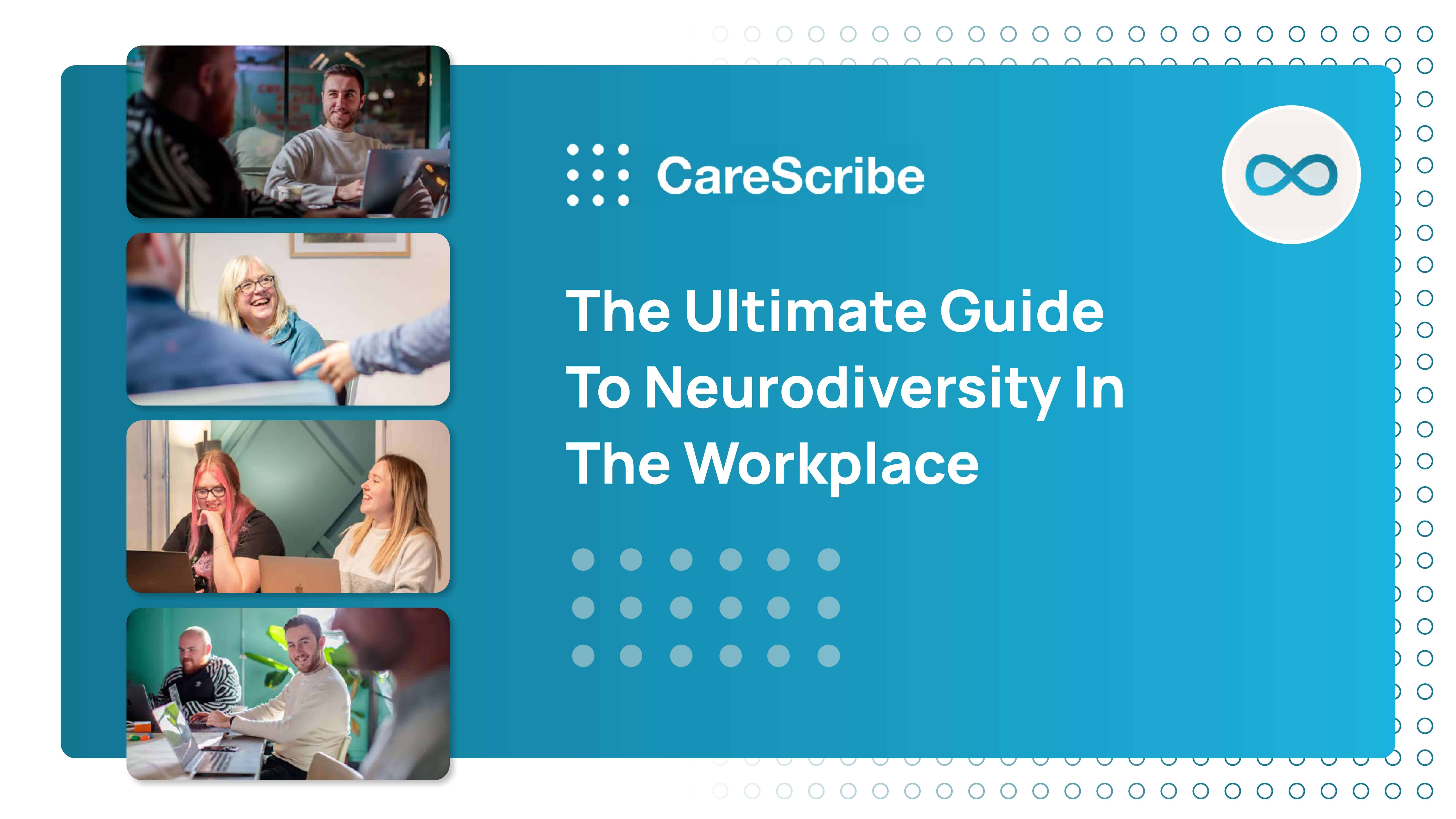Access to Work Guide
Discover the Access to Work (ATW) scheme with this guide, a government-funded grant offering practical support for individuals at work with disabilities, health conditions, or mental health issues. Learn about eligibility, the application process, and the types of support available as well as how this impacts both employees and managers.

What is the Access to Work Scheme?
Access to Work (AtW) is a government-funded grant designed to provide practical support for individuals with disabilities, health conditions, or mental health issues. Its purpose is to assist you in starting a job, remaining employed, or transitioning to self-employment or starting a business. This support is tailored to meet your unique needs, ensuring that all reasonable adjustments are made to help you perform your job to the best of your ability.
The support you receive will be based on your individual needs. Through Access to Work, you can apply for:
- A grant to help cover practical support for your job,
- Assistance in managing your mental health at work,
- Funding for communication support during job interviews
For How Long Is Access to Work Funding Available?
A review will typically take place on a yearly basis to understand if funding is still needed or needs to be changed. If an individual still needs support, then the support should continue.
Who is Eligible for Access to Work
Access to Work provides support to individuals who are:
- In full-time employment
- About to return to paid work in the next 12 weeks
- Self-employed
- Apprentices
- Trainees
- Supported interns
- Doing self-directed work experience
- On Jobcentre Plus promoted work trials
- Going to a job interview
It is not always necessary to be currently in employment, you can also apply if you have:
- A job offer letter
- A job start date
- A letter confirming your interview
If you meet the above criteria, to gain access to support, you must also:
- Have a physical or mental health condition or disability that means you need support to do your job or get to and from work
- Be aged 16 or over
- Live in England, Scotland or Wales – if you live in Northern Ireland, you can gain support through a different system
You cannot get the Access to Work scheme if you live in the Channel Islands or the Isle of Man.
Are There Any Exceptions?
You might not be eligible for Access to Work if you have any of the following benefits:
- Incapacity Benefit
- Employment and Support Allowance
- Severe Disablement Allowance
- Income Support
- National Insurance credits
Can You Get Access to Work Support if You Work From Home?
Yes, you are eligible for Access to Work if you work from home either some or all of the time.
Does Your Income Impact the Level of Support Available to You?
No, you can gain support through Access to Work regardless of your income level.
Can You Get Access to Work Support if You’re a Civil Servant?
No, if you’re a civil servant, you can gain access to support through your employer instead of Access to Work.
Can You Get Access to Work Support if You’re Getting Employment and Support Allowance (ESA)?
You can get both Access to Work and ESA if you work less than 16 hours a week however there are rules about working while claiming ESA.
Can You Get Access to Work Support if You Work Abroad?
If you need to travel out of the country as part of your job, Access to Work support can be provided but there may be limitations.
Can You Get Access to Work Support if You’re Claiming Universal Credit?
Yes, you are eligible for Access to Work if you are claiming Universal Credit and meet the other eligibility criteria.
Can You Get Access to Work Support if You Are From Another Country?
If your company is based in an EU country and you are sent to work in Great Britain, you are eligible to apply for Access to Work.
If you are from a country outside of the EU, you will need to show your visa when applying for Access to Work. A work permit or a leave-to-remain status also means you can apply for support.
What Counts as a Disability, Health Condition, or Mental Health Issue?
To be eligible for the Access to Work scheme you must have a disability, illness or health condition that means you require support to work or have to pay work-related costs.
But what constitutes a disability, illness or health condition in this instance?
You do not need to be diagnosed with a condition to apply and the definition of ‘disabled’, in this instance, matches the definition in the Equality Act 2010 which defines disability as ‘a physical or mental impairment which has a substantial and long-term adverse effect on [your] ability to carry out normal day-to-day activities’.
On the gov.uk site the examples of matching criteria include:
- A physical disability, for example, if you’re hard of hearing or use a wheelchair
- A learning disability or related condition, for example if you have Down’s syndrome
- A developmental condition, like autism spectrum disorder
- Having ADHD or dyslexia
- An illness such as diabetes or epilepsy
- A temporary condition, like a broken leg
- A mental health condition, for example, anxiety or depression
It is also true that a disability that only became apparent to you after starting work can also apply. For example, you might have started work and found that your eyesight was affected by working in front of a computer screen but only realised this after you started work.

The Ultimate Guide to Neurodiversity in the Workplace
What Support is Available?
There is a wide range of support available through Access to Work that goes beyond the ‘reasonable adjustments’ typically made to address work-related challenges stemming from disabilities. The support available ranges from practical and mental health support to communication support and will change depending on the individual as it is tailored to their specific needs.
Practical Support
Examples of practical support that an Access to Work grant could help pay for include:
- Specialist equipment (or potentially changes to existing equipment) and assistive software
- Support workers, for example, a BSL interpreter, a job coach, a travel buddy, a reader for a visually impaired person, or another form of helper for care needs at work
- Costs of travelling to work, if you cannot use public transport. For example, help towards the cost of taxi fares or towards the cost of adapting your vehicle
- Adaptations to your vehicle so you can get to work
- Physical changes to your workplace
Mental Health Support
Examples of mental health support that an Access to Work grant could help pay for include:
- A tailored plan to help you get or stay in work
- One-to-one sessions with a mental health professional
- Suggestions for adjustments in the workplace to support your mental health like giving you additional time to complete certain tasks or providing you with additional training
Communication Support for Job Interviews
If you have an upcoming job interview, you can apply to Access to Work for communication support.
The grant could pay for a support worker, for example, a British Sign Language interpreter if you are deaf or hard of hearing, to go to your job interview with you.
It’s worth noting that you cannot apply for communication support if:
- The interview has already taken place
- You are applying for a volunteer role
Are Reasonable Adjustments Covered by Access to Work?
A reasonable adjustment is an alteration or change that an organisation, service, public function, or venue must make to accommodate people with disabilities, neurodivergence, or physical and mental health conditions.
These are the changes your employer must legally make to support you and so Access to Work will not pay for reasonable adjustments.
This is also true of anything regarded as standard equipment, standard business costs, or standard health and safety requirements. This means Access to Work won’t cover anything that would be needed to complete your work regardless of the fact that you’re eligible for Access to Work.
Is There a Cap to the Amount of Support Available?
There is a cap and this depends on when your grant was first awarded or last reviewed.
The information below breaks down the cap amount per year depending on when your grant was awarded or reviewed
- 1 October 2015 to 31 March 2016 – £40,800
- 1 April 2016 to 31 March 2017 – £41,400
- 1 April 2017 to 31 March 2018 – £42,100
- 1 April 2018 to 31 March 2019 – £57,200
- 1 April 2019 to 31 March 2020 – £59,200
- 1 April 2020 to 31 March 2021 – £60,700
- 1 April 2021 to 31 March 2022 – £62,900
- 1 April 2022 to 31 March 2023 – £65,180
- 1 April 2023 to 7 April 2024 – £66,000
- 8 April 2024 to 31 March 2025 – £69,260
How to Apply for Access to Work
After you have confirmed you are eligible for Access to Work, you can apply for support online or over the phone.
Where to Apply for Access to Work – Contact Numbers
You can apply through the online service here or by using the Access to Work helpline, details included below (available Monday to Friday, from 9 am to 5 pm).
Telephone: 0800 121 7479
Textphone: 0800 121 7579
Relay UK (if you cannot hear or speak on the phone): 18001 then 0800 121 7479
British Sign Language (BSL) video relay service if you’re on a computer – if you’re on a mobile or tablet, you can find out how to use the service here
If you need information in a different format, such as braille or audio CD, this can be requested through the Access to Work helpline.
What Details Do You Need to Supply During Your Application?
You may be asked to provide:
- Your contact details
- your National Insurance number
- Your workplace address and postcode
- Information about how your condition affects your work and what support you think you require
- If you’re employed, details of a workplace contact who can confirm you work there (they will not be contacted without your permission)
- Your Unique Taxpayer Reference (UTR) number, if you’re self-employed
- The name of your New Enterprise Allowance mentor (if you have one)
What if You’re Applying for Communication Support for an Interview?
The details you are asked to supply will change if you are looking for communication support at a job interview.
You’ll need to supply:
- The name of the company your job interview is with
- The date of your job interview
- How long your job interview is expected to last
- The name and contact details for someone at the company – they will only be contacted after your job interview to confirm it has taken place

These Great Minds 🧠
Learn more about our monthly newsletter for neurodiverse professionals
What Happens After You Apply for Access to Work?
Assessment
After you apply for Access to Work, a case manager will get in touch to discuss the assistance you could receive. A workplace assessment may be necessary to evaluate your needs.
If you already know what support you require, an assessment may not be needed. Your case manager will discuss your award and create a customised support package.
If an assessment is needed, it will be conducted by telephone, online video call, or in person at your workplace.
If you are unable to use the telephone or video call, contact the organisation arranging the assessment to agree on an alternative method.
To reschedule or cancel an assessment, reach out to the organisation that set it up for you.
What if You Disagree With an Access to Work Decision?
If you disagree with an Access to Work decision, you can ask for your application to be reconsidered by a different adviser.
What if Your Circumstances Change?
If your circumstances change – for example if you move jobs or you have started to work from home – you can ask for a review. You may be able to transfer equipment to your new employer however you cannot automatically transfer awards for support workers or travel.
What if You Have a Complaint?
If you have a complaint about the service you have received from Access to Work staff, you can get in touch with DWP complaints. This is not a process for complaints about the level of award you have been granted but for things like poor customer service.
How Does Access to Work Impact Managers?
How Does Access to Work Help Managers?
Access to Work can help you to:
- Employ skilled individuals with disabilities.
- Retain employees who develop disabilities or health conditions, preserving their valuable skills and saving on recruitment time and costs.
- Demonstrate that you value and support your employees by implementing strong employment policies and practices
As an employer, you might need to share the cost with Access to Work if the employee has been with you for over six weeks when they apply.
Are Managers Financially Responsible for Access to Work Support?
You will only be responsible for sharing the cost of:
- Special aids and equipment
- Adaptations to premises or equipment
Cost-sharing does not apply to self-employed applicants or the Mental Health Support Service.
When cost sharing is applicable, Access to Work will reimburse up to 80% of the approved costs between a specified threshold and £10,000. As the employer, you will cover 100% of the costs up to the threshold and 20% of the costs between the threshold and £10,000.
The threshold amount is based on your number of employees:
- 0 to 49 employees: no threshold
- 50 to 249 employees: £500
- Over 250 employees: £1,000
Access to Work will typically cover any remaining balance above £10,000.
If the support provides a general business benefit, an additional contribution will be requested beyond the mandatory cost share.
Are Managers Involved in Applications?
After your employee applies for Access to Work, a case manager will contact both of you to discuss potential assistance. If necessary, your employee may undergo a workplace assessment to evaluate their needs.
If your employee already knows what support is required, an assessment is not necessary. The Access to Work case manager will work with you and your employee to develop a customised support package.
If an assessment is needed, it can be conducted via telephone, online video call, or in person at the workplace.
For rescheduling or cancelling an assessment, contact the organisation that arranged it with your employee.
Where Can I Get More Information?
If you are looking for more information on Access to Work, you can visit the government site at www.gov.uk/access-to-work.


